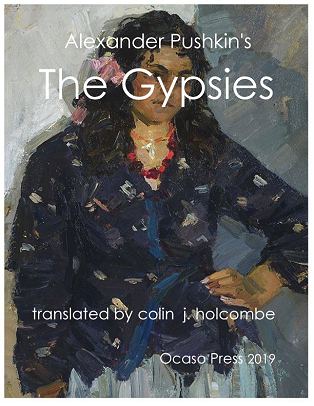Alexander Pushkin was born in 1799 to an
ancient aristocratic family and died of a duelling wound in 1837. In
that short and often thwarted life, Pushkin modernized the Russian
language, widening its vocabulary, removing archaic terms, and
employing tones of address that would make Russian a fit vehicle for a
century of poets, novelists and short story writers, many of them
deservedly world famous.
Published in 1827, The Gypsies is
the last of
Puskin's southern cycle of romantic narrative poems, and the most
popular.

In it Pushkin moves away from the earlier influences of Byron and
Chateaubriand, and fashions something cooler and more exact, a style
that
will serve him well with the later Eugene
Onegin and The Bronze Horseman.
Prince Mirsky called it:
'among the greatest works of Püshkin. .
.
The Gypsies are not treated realistically but merely as ideal
representatives of a natural state of human society. . . a strong
affirmation of freedom. . . and patently a plea for anarchism. It was
Pushkin's first attempt at tragedy and one of his greatest. It is less
easy to do justice to its poetical beauty, and speaking of it, one is
too likely to forget the lesson of restraint that is the best lesson to
be learned from Pushkin. The verse, less fluent and voluptuous than in
The Captive and in The Fountain, is tighter, fuller, and more saturated
with complex expressiveness. Such passages as the old gypsy's tale of
Ovid, the end of the poem (with the speech of the old man on Aleko's
murder), and especially the epilogue, are unsurpassable summits of
poetry.'
A free Pushkin Gypsies e-book in pdf format.
The gypsies in their noisy way
that far through Bessarabia roam
are camped across the river, stay
in threadbare tents that make their home.
5. But they are free: the heavens keep
their welcome for this peaceful race:
between the wagon wheels they sleep:
the folded rugs give each his place.
A fire burns: around the blaze
10. are people on their dinner bent.
In open fields the horses graze;
a tame bear’s loose behind the tent.
The steppelands come alive with sound
when on the morrow all are found —
15. while children cry, and women sing —
to exit from their camping ground
to beats the marching anvils bring.
For now there’s only silence where
the night for nomads takes its course.
20. The bark of dog or neigh of horse
comes thinly through the steppeland air.
The lights are doused, and everywhere
a calm collects. The moon is bright.
The camp beneath its heavenly care
25. is flooded with a silver light.
But one old man is not asleep
and from the warmth the ashes keep
still gazes from his tent to see
across the steppeland's distant sweep
30. the night mists glimmer hazily.
There went his daughter, far from sight —
so much in love of freedom grown
she often wandered on her own.
She will return, but now the night
35. is dark about him, moon foretold
to leave its cloudy-pillared state,
yet no Zemfira comes, and cold
the scraps of food left on his plate.
The extensive references for this entry can now be found in a free pdf compilation of Ocaso Press's Russian pages.